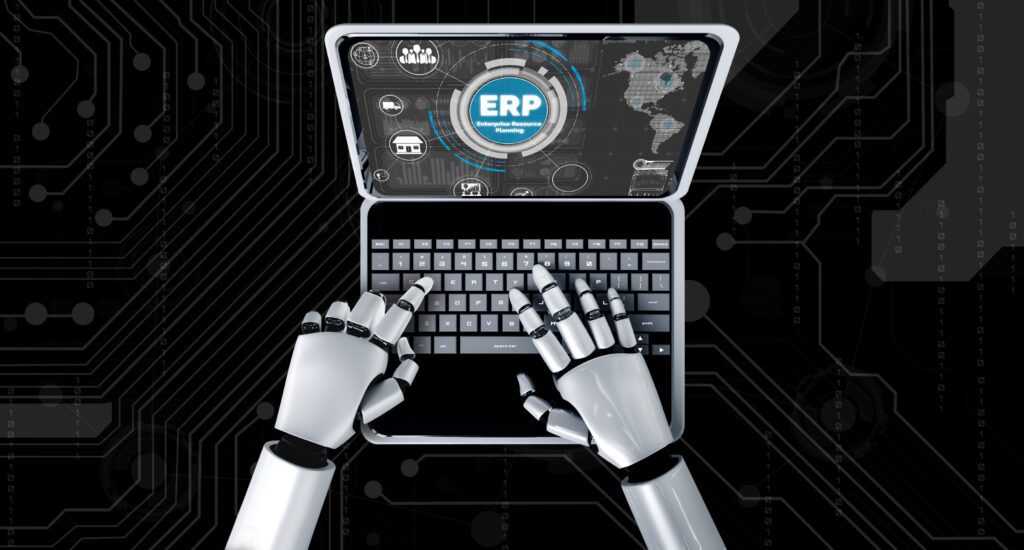
Increasing competition and other challenges have made the business landscape more complicated than ever. Modern enterprises rely on ERP (Enterprise Resource Planning) software to address these challenges. Here, AI can be a game-changer technology bringing intelligence and automation in ERP systems. Let’s dig deep into the role of AI in ERP and understand how this revolutionary technology benefits enterprises.
AI in ERP systems refers to the addition of artificial intelligence for performing specific tasks including learning, decision-making, and troubleshooting. AI, together with Machine Learning (ML) and data analysis, brings automation and handles customer relationship management (CRM) to ensure growth. AI-powered ERP solutions can increase agility and give businesses a competitive edge. Let’s go through the importance of AI in ERP software.
Importance of Artificial Intelligence in ERP
These days, AI has become a pivotal consideration for business systems. The major reason for its increasing popularity in the corporate sector is its capability to drive digital transformation. The advent of OpenAI ChatGPT has demonstrated the power of AI to the world. In such a scenario, we will witness the prevalence of AI in global enterprises.
The combination of AI, ML, and NLP (Natural Language Processing) empowers ERP solutions to streamline and automate complex workflows. As per Statista report, enterprise software revenue occupies 41% share in the global software market. The addition of AI will expand the horizons of ERP and other business solutions in the coming years.
Here we mention a few noteworthy benefits of AI in ERP systems.
Key benefits of AI in ERP systems
AI transforms the way ERP solutions work providing many benefits across different departments. Here are the top benefits of AI in ERP systems-
Predictive capabilities
AI can analyze historical data and market trends to forecast future conditions, enabling businesses to make proactive decisions in real time. Moreover, companies can optimize inventory levels, production schedules, and resource allocation by predicting product demand accurately.
Effective insights
As AI excels at processing large volumes of data, it makes it possible to identify patterns, correlations, and anomalies that would be otherwise difficult to find out. Furthermore, AI transforms raw data into actionable insights, helping businesses make informed decisions.
Decision support
AI can analyze supplier performance, market prices, and inventory levels to optimize purchasing decisions and reduce costs. It can also analyze customer data to identify ideal customer segments, enabling targeted marketing campaigns and increased ROI.
Customer service
AI-powered chatbots and virtual assistants can provide efficient customer support, answering queries and resolving issues promptly. ERP systems become more intelligent, efficient, and customer-centric by leveraging the advancements of AI technology.
These are some of the major reasons why big names in ERP have already adopted AI technology.
Five ways AI reshapes the ERP systems
AI can bring radical changes in the way ERP solutions work. Here are the top factors in which AI influences the most in tailor-made ERP software-
Data handling and business intelligence
AI boosts ERP’s data handling capabilities enabling deeper insights and better decision-making. It can uncover hidden patterns and predict trends by analyzing vast datasets. For instance, AI can analyze customer purchasing behavior to tailor inventory.
Streamlined processes and automation
AI-driven ERP systems streamline operations by automating routine tasks like invoicing and scheduling. As a result, your staff can focus on strategic initiatives. Moreover, AI can identify process inefficiencies and suggest improvements, leading to increased efficiency.
User behavior and experience
AI enhances ERP usability by offering users personalized experiences. AI can tailor search results, present data in a user-friendly format, and provide intelligent suggestions. This simplifies navigation and empowers users to make informed decisions.
Conversational and Generative AI
Conversational AI transforms ERP interaction, enabling users to ask questions and request information in natural language. Generative AI can create visual representations of data and make comparisons visible. These advancements make ERP systems more user-friendly.
Third-party AI solutions
While many ERP systems offer built-in AI capabilities, companies can integrate third-party AI solutions. It can give additional flexibility and advanced features. These solutions can address specific business needs and complement the core ERP functionality.
AI empowers ERP systems to become powerful tools by handling these five areas.
Top examples of AI in ERP solutions
AI can take ERP software to a new level. Several ERP systems offer AI features that automate routine tasks. Oracle ERP has used AI for expense audits and supplier recommendations. Additionally, AI can analyze vast amounts of data to provide valuable insights for decision-making. For example, Microsoft Dynamics 365 has used AI in sales forecasting and customer segmentation.
AI can streamline user interaction with ERP systems through features like natural language search. Acumatica ERP has used this feature. Epicor Virtual Agent (EVA) has automated tasks using NLP and gives proactive alerts to users. Apart from that, EVA offers personalized task recommendations based on AI technology. These features enable users to access information and complete tasks more easily, boosting overall efficiency.
Conclusion
ERP systems can integrate all business operations to give modern companies a significant advantage. AI technology, on the other hand, can take ERP solutions to new heights by improving efficiency and productivity. AI capabilities can make it possible to optimize processes and make more informed decisions.
In a nutshell, the integration of AI in ERP can bring opportunities for growth and open the doors of new possibilities. We expect more advanced AI-powered ERP solutions as this revolutionary technology evolves.
